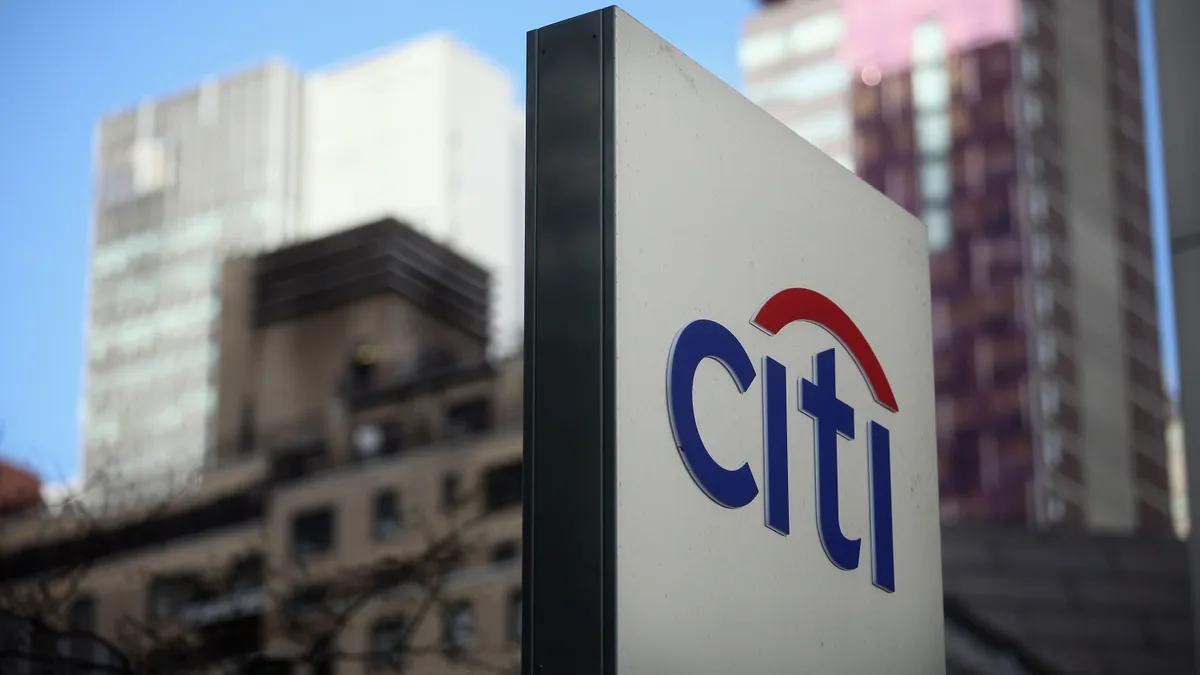A Citi whistleblower is not entitled to a share of the $400 million fine the Office of the Comptroller of the Currency handed the bank in 2020, a federal appeals court judge ruled Tuesday.
Documents and other evidence Tamika Miller included in a whistleblower lawsuit she filed in November 2019 gave the OCC a “roadmap” to examine conduct within the bank’s third-party audit unit, one of Miller’s attorneys argued in 2022, adding that the exam revealed deficiencies across the company that led to the fine.
Miller claimed in her lawsuit that she saw her senior management manipulate draft and final audit ratings for third-party vendors in Citi’s system — data that affected the monthly reports of the department in which she worked: risk management.
Miller also accused Citi of doctoring reviews she wrote in a way that would trivialize concerns she raised about the bank’s controls. Further, she alleged Citi employees minimized issues in audit reports so they wouldn’t trigger regulators’ attention and warrant a failing grade, according to the lawsuit.
But Judge Denny Chin of the 2nd U.S. Circuit Court of Appeals said Tuesday that Miller did not show that her whistleblowing obligated the bank to pay a penalty. Rather, the OCC had discretion to fine Citi, Chin wrote.
Miller sued under the False Claims Act, but the suit was "bereft of the details needed to provide Citibank with 'fair notice' of her claim, and instead resembles an attempt to use the litigation process to discover hypothetical wrongdoing,” Chin wrote Tuesday in a ruling seen by Reuters.
Neither Miller’s lawyers nor Citi would immediately respond to requests for comment from the wire service.
Tuesday’s ruling marks at least a third blow to Miller’s case. The Justice Department declined to pursue it in 2019. And a district court judge denied her claim in 2022, ruling that “nothing” in the OCC’s 2020 consent order against Citi “suggests that the fine was imposed for deficiencies in Citibank’s oversight of third-party vendors.”
Miller has said she first brought her concerns to Citi’s ethics department in 2018 and was told the bank would investigate. The bank later told her no violations were found, she said.
“The ‘investigation’ was hardly an investigation at all,” Miller said in her filing, according to Bloomberg. “Instead I was instructed going forward not to return to ethics with any future concerns. In fact, I was told to report any future concerns to my senior management, even though it was my senior management who was engaged in manipulating” the system.
Miller claimed, too, that Citi retaliated against her — through “fabricated reprimands, abusive and insulting language, and loss of work” — after she took her concerns to ethics, according to Law360. Some of the actions included racial, harassment or bullying actions, she said. Miller is Black.
U.S. attorneys, in April 2022, contended the workstream within the OCC that addressed Miller’s complaint “was separate and distinct from the then-already ongoing OCC workstream that was handling and discussing the supervisory concerns ultimately addressed in the 2020 [civil penalty].”
The attorneys called the 2020 order “the culmination of several years of work by the OCC’s Citibank examination team to address certain of the bank’s deficiencies through the OCC’s supervisory process.”
The district court judge in the 2022 case ruled that Citi’s “alleged violations of federal law or consent orders may have subjected it to liability, but they did not give rise to an ‘obligation’ within the meaning of the FCA.”
In that sense, Chin’s ruling on appeal Tuesday aligns.
Miller’s case, though, wouldn’t be the only one that alleges Citi execs fudged data to be in the OCC’s better graces.
Kathleen Martin, Citi’s onetime interim data transformation chair, alleged in a lawsuit in May of this year that her boss, Chief Operating Officer Anand Selva, asked her to hide information from the OCC because the data would make the bank “look bad.”
Martin was hired in 2021 to “revamp [Citi’s] data processes” in the wake of the 2020 consent order “and avoid further legal jeopardy,” according to her May complaint.
Martin alleges Selva pressured her to lie to regulators about Citi meeting certain metrics “almost as soon as he was promoted [to the COO role in 2023].”
Further, “the more Martin pushed back against this unlawful activity, the worse things got,” eventually leading to her being fired Sept. 25, 2023, according to the suit.
Citi has urged the district court to dismiss Martin’s complaint alleging retaliation.
Miller, meanwhile, could have received up to $120 million if the appeals court overturned the district court’s ruling. Under the False Claims Act, a whistleblower can get between 15% and 25% of the recovery if the government intervenes. In her case, it did not, meaning the figure would rise to 25% to 30%.






















